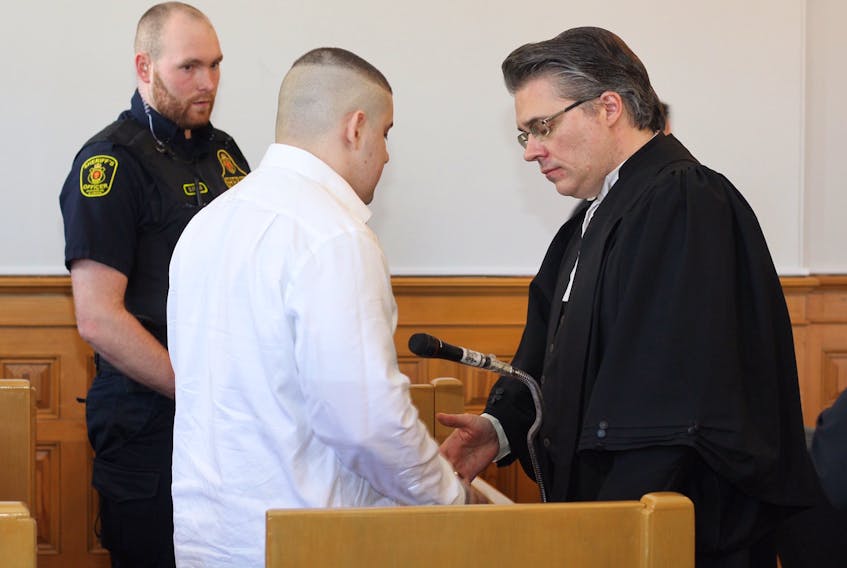ST. JOHN'S, N.L. — Prosecutors in the trial of Graham Veitch told a judge Friday they believe the 21-year-old should not be held criminally accountable for murder.
Crown lawyer Jennifer Colford told Justice Sandra Chaytor that she and fellow prosecutor Shawn Patten had considered the evidence of two forensic psychiatrists who had testified at trial, and the Crown agrees with Veitch's lawyers that Veitch was too ill to appreciate what he was doing when he killed David Collins in December 2016.
"It is the Crown's submission that on the night of December 18, 2016, Mr. Veitch was suffering from a delusion as a result of the disease schizophrenia," Colford said.
Veitch has admitted to killing Collins, 55, who was his mother's partner, by striking him repeatedly in the head with a hammer at the family's Logy Bay home.
According to an agreed statement of facts presented to the court at the beginning of the trial, Veitch came barreling downstairs to the living room shortly after supper and struck Collins a number of times with a hammer.
While his mother and brother called 911, Veitch went on the run in Collins' vehicle, communicating with an RNC negotiator periodically on a cellphone. He eventually returned home, where he was arrested.
Collins was an accomplished and well-liked local pharmacist.
The statement of facts indicated Veitch had been suffering from depression and paranoia, and had been hearing voices, having other hallucinations and exhibiting bizarre behaviour in the months leading up to Collins' murder, according to his family members, an ex-girlfriend, a friend and former employers. This behaviour continued after his arrest.
Video recorded by the RNC during an interview with police after he was taken into custody show Veitch appearing confused, pacing the room, making bizarre facial expressions and arm gestures, and speaking in broken and run-on sentences.
Veitch has since been diagnosed with schizophrenia by three psychiatrists, including Dr. David Craig at Her Majesty's Penitentiary.
Veitch, suffering from delusions, wrongly believed Collins was a threat to him and his family, and told police he had been "trying to protect" his loved ones and that striking Collins was his "only choice."
Colford pointed out in her closing submissions that Veitch had admitted to striking Collins until he believed he was dead, and throwing the hammer into the ocean at Outer Cove beach to "hide the evidence," saying it suggested Veitch understood what he was doing.
She noted, however, that Dr. Nizar Ladha and Dr. Phillip Klassen, forensic psychiatrists, had explained to the court that due to his illness, Veitch was wrongfully convinced he was doing the right thing and had been unable to distinguish between moral and legal right and wrong.
"Schizophrenia is a mental disorder, according to the forensics psychiatrists that were referred to during this trial," Colford said. "The delusion was that Mr. Collins was a threat to Mr. Veitch and his family. As a result of that delusion, Mr. Veitch took a hammer, struck Mr. Collins a number of times in the head, and killed him. The delusion led Mr. Veitch to believe that killing Mr. Collins was both necessary and justified. In reality, that was untrue, as Mr. Collins was not a threat to Mr. Veitch nor his family.
"Given the delusion deprived Mr. Veitch of the ability to rationalize and apply his knowledge of right and wrong to the situation, it is the position of the Crown that Mr. Veitch should be found not criminally responsible on account of mental disability that rendered him incapable of knowing that the actions he was performing were morally wrong."
Veitch's lawyers, Mark Gruchy and Jason Edwards, told the court the case was a "textbook example of what a not criminally responsible case looks like."
Gruchy said there was no way to understand Veitch's "explosion of violence" other than to accept it was a result of his untreated schizophrenia, and pointed to statements provided to police by those who knew Veitch. Multiple people described noticing Veitch acting strangely, starting in the spring of 2016.
Though the Crown and defence are in agreement, Chaytor has the final say when it comes to the verdict in the case. She will deliver her decision July 4.
On Friday, she commended all four lawyers for their sensitivity and co-operation in the case.
"This is indeed a very tragic case and it's tragic for everyone involved," Chaytor said, acknowledging family members of both Veitch and Collins in the courtroom.
If Veitch is found not criminally responsible for the murder, he will be transferred from prison to the Waterford Hospital, where he will remain in treatment at the discretion of the Criminal Code Mental Disorder Review Board.
The board, which includes mental health care workers and a former provincial court judge, is responsible for reviewing and making decisions related to the management of people found not criminally responsible for criminal acts, as well as accused who are deemed unfit to stand trial.
Twitter: @tara_bradbury
Related









